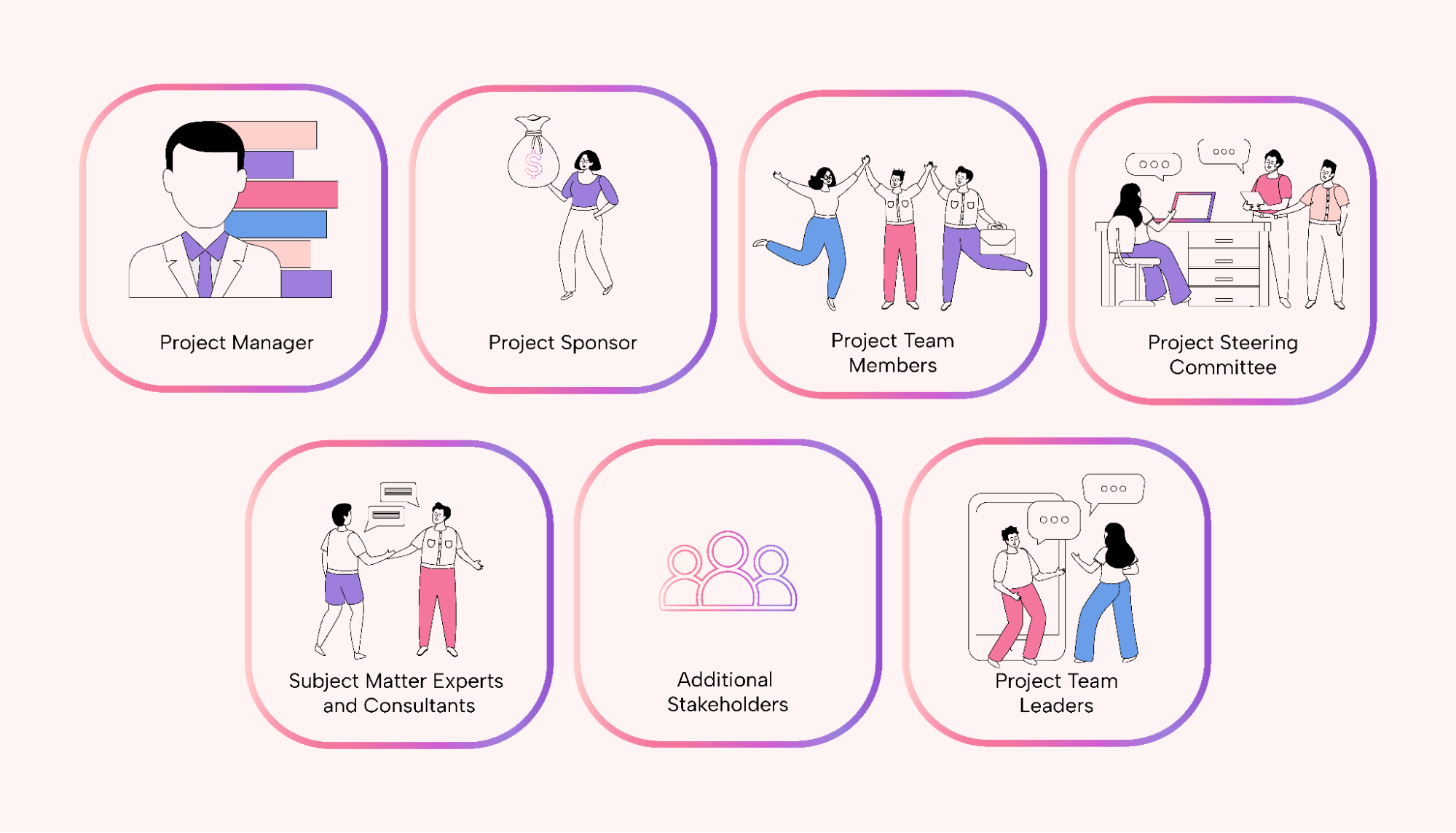Any business that starts a project hopes to complete it. A successful project should be delivered on time and within budget. Otherwise, delivering a project months or years past the deadline is an outright failure. The same applies to delivering a project with a bloated budget expenditure.
Businesses completed only 55% of their projects on time. Additionally, they completed only 62% of their projects within the original budgets. These statistics show that at least a third of all projects are completed above budget and beyond the set timelines.
A common reason for project failure is using the wrong project team. The wrong team does not mean unqualified team members. A team may have skilled and experienced professionals but may not be cross-functional.
Small businesses should create effective project teams for improved project success. A good project team should be cross-functional and understand its roles.
In this article, we’ll cover:
- project teams and their benefits,
- common roles within project teams,
- common challenges project teams face, and
- effective strategies for running successful project teams.
What are project teams?
The simplest definition of a project team is a group working together towards a common goal. The common goal could be the project outcomes. Most project teams comprise members with different talents and skills. This makes the team cross-functional.
For example, suppose your business plans to host an end-of-year party. If you are a small business, you may lack funds to outsource event planning services. The next option is to involve your employees and delegate the event planning roles. One employee may design and send invitation posters. Another may work on decorations. The most trendy and fashion-savvy may decorate the event venue.
Based on the example, we can understand the meaning of a project team and its functions. Everybody in the team has an important role in making the end-year party successful. The workers also have to work together. Similarly, project team members must collaborate to achieve project goals.
How do businesses gain from having project teams?
Many people will agree that having the right people in a team makes the work a lot easier than it would otherwise be. You also want to work with people who understand their roles. Nobody wants to team up with people who don’t respect deadlines or communicate. Such concerns underline the importance of using project teams.
Below are some reasons businesses should use project teams.
Leverage different skills for project success
Project teams bring together people with different skill sets. The goal is to create a cross-functional team that meets the project’s needs. The project team may comprise both in-house and outsourced skills. Outsourcing allows businesses to access any expert skills they may not have in-house.
 |
Improved collaboration
Collaboration is among the primary ingredients of project success. Project managers ensure team members work together to deliver project outcomes. Collaboration with relevant stakeholders is also important to project success. For example, the project team should have the support of the senior-level managers.
Organizational efficiency
Project teams support effective organization and task delegation. Each team member should understand their duties and roles. The project manager should also define the organizational structure within the project team. This includes appointing team leads and determining “who reports to whom.”
Customer satisfaction
Small businesses can leverage project teams to achieve customer satisfaction. Project members work together to deliver the desired project outcomes. They also ensure they deliver outcomes within the set deadlines and budget. This culminates in satisfaction among customers or end-users.
4 common roles within project teams
Most project teams are cross-functional. However, their composition varies from one project to another. A team working on an inventory management system may need a software developer. In contrast, a project team working on an end-year party may not need one.
Businesses should ensure their project teams have the right skill profile. Below are some common roles within project teams.
Project manager
Project managers double up as project leaders or supervisors. They oversee the whole project and manage the team members. Project managers take part in all project management steps. For example, they work with senior managers to identify and define project goals. They also ensure the project goals align with company strategies.
Project managers are central to their teams’ efficiency and performance. They motivate their teams to own and commit to the project. Project managers should also provide a role model for their team members. For example, they should collaborate and communicate with team members. They must also ensure each member knows and understands their role.
It is also the role of a project manager to track a project’s progress. They ensure projects are within schedule and budget. They also track project KPIs and ensure the team delivers timely outcomes.
Project team members or development team
The development team comprises people who undertake actual project tasks and activities. They often have specific skills they bring to the team. The team consists of members recruited in-house and those contracted temporarily. A business may also hire consultants mid-project for extra help.
Team members should work together to complete tasks on time and within budget. They must also communicate effectively, especially when working within a cross-functional team.
Project sponsor
The project sponsor is responsible for the project's overall success. They are the project champions and secure stakeholder buy-in during the initiation phase. They are also responsible for retaining stakeholder support throughout the project cycle.
Project sponsors also ensure projects align with organizational goals. This is a critical role, especially for companies using agile methodologies. They ensure changes in user stories do not skew the project goals.
Other roles of a project sponsor include:
 |
- Making high-level decisions that determine the direction of the project.
- Providing a link between project managers and senior management.
- Updating company executives on the project’s progress.
- Closing the project at the end of the life cycle.
Other members
Some projects require the input of other experts outside the development team. These members are often optional but are important to project success. For example, a company may hire a business analyst on a short-term basis. The consultant may only be part of the team when their services are needed.
A project’s sensitivity may also warrant having a steering committee. Most steering committees comprise top-level managers. The committee often plays a mentorship or advisory role. They “coach” project teams to ensure they achieve the desired outcomes.
Finally, some project teams include a few stakeholders whom a project will impact. Examples include end-users or customers. Such stakeholders provide user feedback to ensure the project outcomes meet expectations.
5 reasons your project team is not effective
Some businesses establish project teams but continue to register high failure rates. Your project teams may be ineffective for various reasons. Common challenges include unclear goals and inadequate resources. Let’s discuss the reasons in detail below.
Lack of clear project goals
A sizable percentage of project teams fail because of unclear project goals. Poorly defined goals lead to scope creep. Poorly defined goals also lead to poor business outcomes. For example, some businesses keep altering the deliverables mid-project. This often increases the project team’s workload. Sometimes, project teams have to drop tasks midway. This causes chaos within project teams, causing them to miss deadlines.
Unrealistic deadlines
Unrealistic schedules pressure the project team to rush over tasks. The project team often ends up chasing the deadlines instead of outcomes. Team members may overlook some details to save time. For example, they may ignore user feedback if it requires redoing the work. This is common, where small businesses commit to more projects than they can handle. The downside is that you may disappoint the customers, losing future business.
Lack of accountability
Some teams have overlapping roles and responsibilities. This means team members do not know what they should do and when they should do it. Overlapping roles means no one can be held accountable for missed deadlines or undelivered tasks. Finally, not having a clear authority structure makes it hard for project managers to oversee the team effectively.
 |
Poor resource allocation
Inadequate resources limit the team’s ability to complete tasks effectively. This includes both the human skills and equipment required for project activities. For example, suppose a team is tasked with designing and printing wedding invitation cards. Not having access to a designer will likely result in project failure.
Poor resource allocation also involves when the resources are availed. The project team may receive the resources but not when they are most required. This challenge often arises from logistical challenges. The project team may fail even with unlimited resources if they cannot access them when needed.
Lack of support from senior management
A project team cannot meet its goals without the support of the senior management. For most businesses, the senior managers decide on budget allocation and project deadlines. Allocating inadequate resources to a project means the team cannot complete some tasks.
Senior managers facilitate or inhibit project teams through decision-making. Timely decisions allow the project team to work seamlessly and without interruptions. In contrast, delayed decisions disrupt work as the team awaits approvals.
5 ways to run an effective project team
Having a project team does not mean automatic success. You must have effective strategies to ensure the team meets expectations. Below are five ways to make your project team more effective.
Communicate the team’s and individual roles clearly
Project managers should communicate their teams’ roles. This includes each member’s duties and responsibilities. The project manager should also appoint team leads and define their duties. They may allow some team leads to make low-level decisions. This improves efficiency as members must not wait for the project manager to make all the decisions.
Project managers should also define the team’s organizational structure. Each member should know to whom they answer and report. For example, the project manager may appoint a member to monitor an identified risk. The team should report matters relating to the risk to the assigned member.
Set up a balanced cross-functional team
Most project teams are cross-functional. This is expected as different skill sets are required to complete a task. Project managers must ensure their teams have the right skill profile. This involves the quality and quantity of human resources.
Having the right skill set but in the wrong quantity slows the team’s progress. Similarly, having surplus skills may cause inefficiencies, including resource wastage. The cost implications are higher when the skills are outsourced.
Have a clearly defined project plan
We cannot overemphasize the importance of having a clear project plan. Most projects fail because they use vague plans. The project plan impacts everything about the project. This includes the project schedule, budget, deadlines, and resource allocation.
 |
A common mistake small businesses make is using the project charter from the initiation phase as the project plan. This means they work with vaguely defined goals. The project scope is also not clearly defined in the project charter. Project managers and business owners must have a clear plan before starting a project. The plan should have well-defined goals, milestones, timelines, and scope.
Maintain clear communication
Project managers should encourage clear communication within project teams. They should also communicate effectively to lead by example. For example, project managers must communicate the team’s goals. They must also ensure each member knows and understands their role.
Members should also maintain clear communication amongst themselves. They should share information seamlessly for effective collaboration. One way to foster collaboration is by encouraging two-way communication. An example is members confirming they have received files or updates.
Finally, project managers should create effective communication channels within and outside the team. This includes bottom-up and top-down communication. For example, any project changes the senior managers approve should trickle down to all team members.
Project managers can integrate communication tools for effective information sharing. They can use project management software like Motion to facilitate communication among team members. Such tools also effectively broadcast project updates to the team and other stakeholders.
Regular team performance reviews and feedback
One way to maintain your project team’s performance is holding regular reviews. The review meetings can include team members and other stakeholders. Team members may report work-related challenges. They may also recommend ways to improve the team’s efficiency.
Performance reviews are also an opportunity to commend positive performance. The project manager and senior managers should reward good performance to motivate the project team. Senior managers should also commit to addressing the highlighted issues. Such support empowers the project team to meet its goals.
Create a winning project team for improved business success
Considering the time and resources spent planning and executing projects, it would be wasteful to use the wrong teams. Small businesses should make use of project teams for improved business success.
Companies should also equip their project teams with effective project management software. For example, project teams can use Motion for all stages of project management, including planning, scheduling, and resource allocation.
Project managers can also use Motion to map the project activities and milestones. They can also use Motion to communicate project goals and objectives and assign roles and responsibilities.
Motion has a calendar app that project managers can use to schedule tasks and activities. Motion will take project tasks and other work and automatically schedule them for you and your team based on priorities, deadlines, and dependencies. Project team members don’t have to plan their schedules because Motion can do it for them.
Apply for Motion’s free trial today!





